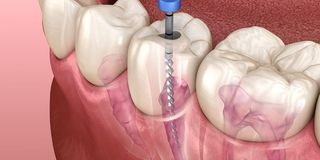Prime
What happens if you do not complete the root canal treatment you started?

What you need to know:
- Modern root canal treatment is similar to a routine dental filling and can usually be completed in one, two or three appointments, depending on the condition of the tooth and your personal circumstances.
- Saving the natural tooth with a root canal treatment has many advantages including efficient chewing, normal biting force and sensation, natural appearance and protecting other teeth from excessive wear or strain.
A root canal is the treatment designed to eliminate bacteria from the infected root canal system of the tooth, prevent re-infection and preserve one’s natural tooth. When one undergoes a root canal, the inflamed or infected pulp is removed and the inside of the tooth is carefully cleaned and disinfected, then sealed.
Modern root canal treatment is similar to a routine dental filling and can usually be completed in one, two or three appointments, depending on the condition of the tooth and your personal circumstances. Saving the natural tooth with a root canal treatment has many advantages including efficient chewing, normal biting force and sensation, natural appearance and protecting other teeth from excessive wear or strain.
Indications that you might need a root canal include severe pain while chewing or biting, a chipped or cracked tooth, lingering sensitivity to hot or cold foods or drinks even after removing the stimulus, deep decay or darkening of the tooth and pimples on the gums, among others.
Why you must complete
A root canal is one of the most common dental treatments and it is generally considered a safe procedure. However, there are some rare cases where patients fail to complete the treatment which can lead to more complications:
Infection: Infection can not only lead to tooth loss but it can be life threatening. Therefore, it is important to complete your root canal treatment to avoid such.
Bone loss: This can happen because the process exposes nerves and surrounding bone. The exposed bone cells may then start to break down, which can lead to a decrease in bone density.
Nerve damage: This can cause severe pain in the tooth and other parts of your body. In some cases, nerve damage may lead to limited or no movement in the tooth or its surrounding muscles. If left untreated, nerve damage can result in a permanent damage to the tooth or the inability to speak or eat properly.
Loss of tooth structure: If you do not complete your root canal, your dentist may need to remove more of your tooth than they otherwise would.
It is important to remember that while some discomfort may be experienced when undergoing root canal treatment, it typically only lasts for a few minutes. No pain should be felt during the procedure since anesthesia is used to numb the tooth.
Dr Muhammad Matovu, dental surgeon




